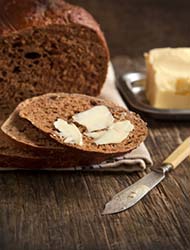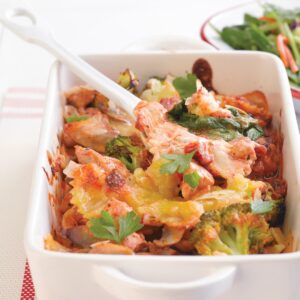
Diet is never far from the headlines. In particular, our increasing obesity problem, and what should be done to solve it.
One recent attempt at tackling the subject was on TV3’s Third Degree programme, where fat was in the spotlight. The provocative premise: “Does eating fat actually make you thin?” The programme tried to set up the idea of a ‘war’ between two different camps within the scientific community – one with the established advice that saturated fat is harmful and causes heart disease, and the other side saying that advice is all wrong, and eating fat is actually good for us. Unfortunately the main message that came across from this piece was a confusing one – and one that neither side of this particular debate, I’m picking, would be happy about.
That message was: eat more fat, especially saturated fat. We saw people cutting slabs of butter to go into mashed potato; whipping up mousse from cream and protein powder, and roasting chicken in garlic butter. We were walked through the supermarket and advised to pick full-cream milk and meat marbled with fat. However, we were not really presented with the rest of the so-called ‘low-carb, high-fat diet’ which, as the name suggests, involves getting up to 80 per cent of our energy from fat. To do that in practice, you also have to cut out practically all carbohydrates (so no mashed potatoes, then). If the main message we took from the Third Degree piece was simply ‘eat more saturated fat’, it has the potential to do a lot of harm to our bodies. For most of us, simply adding more saturated fat into our normal diets without radically changing everything else is a recipe for poor health and weight gain.
It is important to be open to new theories – this is after all how all new scientific discoveries happen. Of course, not every new theory turns out to be right. While the idea of the low-carb, high-fat diet is interesting, right now it is just that: a theory. As Professor Jim Mann (a member of the HFG Editorial Advisory Board) pointed out on the programme, there is no evidence at the moment to prove that this diet has long-term benefit and, crucially, there’s also no evidence to show that it does no long-term harm. We – along with the rest of the nutrition community – will be following the research on this with interest.
In the meantime, what do we know about fat – and what does it mean for us? Firstly, it’s fair to say that the ‘low fat’ message is outdated. We do need fat in our diets; it plays lots of important roles in our bodies. It’s important, though, to choose our fats wisely.
While a little butter won’t hurt you if the rest of your diet is mostly whole foods and plants (remember it’s all about the big picture), it’s a long way from there to ‘saturated fat is a health food’. The body of evidence shows that replacing saturated fat with unsaturated fat (not refined carbs) is a good idea for health, and will cut your risk for heart disease.
So what are healthy fats? They’re unsaturated fats that come from plant foods such as nuts, seeds, avocadoes and olives and their oils, and oily fish.
Choosing fats wisely also means avoiding baked or fried foods such as cakes, muffins, pastries and deep-fried takeaways, which combine saturated fat with refined carbohydrates, salt, sugar and trans fats in a quadruple-whammy of unhealthiness. One thing everyone in nutrition does agree on is that these things combined are a health disaster.
At Healthy Food Guide, we are in the business of making life easier, not more confusing. As you will know, if you are a regular reader, we are not fans of anything extreme when it comes to diets. We don’t think eliminating foods or entire food groups is a good idea. That’s’ because any kind of extreme diet is difficult to stick to, long term – it’s just not sustainable or convenient for most people. So we stick to the evidence and don’t jump on to every diet fad that comes along.
Our menu plans reflect that message of moderation. They average around 47 per cent of energy from carbohydrate, 23 per cent from protein and 30 per cent from fat. Individually our recipes vary: some will be lower in carbohydrate and some will be higher, and it’s the same with fat. But all you really need to know is this: our recipes use real, whole foods that are easy to find and family friendly. We always load our recipes with veges, which we tell you about with the vege serve icons. They’re easy to make and they taste good.
It’s not radical, no, but it’s not confusing either. It is, we think, easy to understand, practical and relevant to the lives of most Kiwis.
*For more on fat, see ‘The truth about fat’ feature in the December 2013 issue of Healthy Food Guide.
www.healthyfood.com











